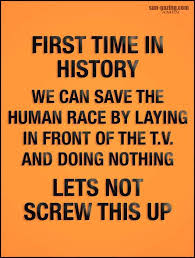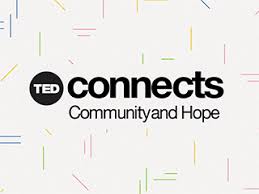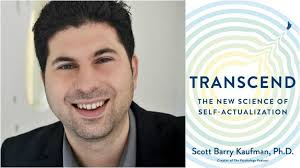From Me to We

We have all had our lives turned upside down by the coronavirus pandemic.
I’m no exception.
On good days, I’m able to get beyond the news and the fears that I have for myself, my loved ones, and my society and think about the broader implications of what’s happening.
Far more than I like to admit, though, I’ve struggled to find enough focus to think creatively about what’s going on. That was certainly true this week, until….
Let’s Not Screw It Up
My sister just sent me this statement that is going viral on the internet. I couldn’t track down where it came from, and I didn’t agree with all of it. Still, it’s worth paying attention to, at least in this slightly abridged form.
This is the first time in history we can save the human race by lying in front of the TV and doing nothing. Let’s not screw it up!!!ANDIn one week, we’ve seen how healthcare workers, truck drivers and grocery store employees are more important than NHL players, actors and the supposedly famous.ANDHey creative community! Just a reminder that Shakespeare was quarantined for the plague when he wrote King Lear. No pressure!!!ANDAlso highly contagious is kindness, patience, love, enthusiasm, and a positive attitude. Don’t wait to catch it from others…be the carrier!ANDStill haven’ decided where to go for Easter — the Family Room or the Living Room.ANDRemember when we thought we were going to have a bad week because of the time change, full moon, and Friday the 13th. We didn’t have a clue!ANDDefinition of irony: gas under one dollar a liter and no place to go…ANDHome schooling going well – two students suspended for fighting, one teacher fired for drinking on the job!ANDMaybe now society will realize we can make it without celebrities and professional sports… but we can’t make it without farmers and ranchers!ANDYour grandparents were called to war. You’re being called to sit on your couch. You can do this!!ANDWith March and April cancelled, the next holiday is Cinco De Mayo – sponsored by Corona.ANDSince everyone has started washing their hands like we’re supposed to, we’ll be working on shapes and colors next week.
From Me to We
Public Goods
The first comes in terms of public policy in ways that take me back to my earliest days teaching comparative politics. I used to teach a course on social and economic policy in Europe and the United States. Among other things, i helped my students understand why the United States lagged far behind most European countries in providing public goods, including public health, social services, environmental protection, and the like. There are dozens of reasons why that’s the case, many of which revolve around our cultural norms that stress the importance of limited government and our assumption that market forces work better than an interventionist state.
Now those assumptions are being called into question in ways I could not have imagined when I taught that course in the 1980s and 1990s. The shortcomings of a weak state that has a hard time acting quickly or decisively are there for all to see in our inability to provide enough tests for the virus, adequate health care coverage for all, and more.
Many of my friends want to blame this on the current administration. While it is true that Trump and his colleagues deserve a lot of that blame, the problems run deeper in a socity that has never done a good job of providing basic services to all of its citizens, which we have longed known that markets will not do on their own.
To that end, I was heartened by recent research reported in the New York Times that showed that more Americans support policies that reduce inequality, provide health care for all, and address other collective problems or public goods. The evidence is far from clear. Still, there are signs that Americans are coming to grips with the policy failures I taught about all those years ago and that are now playing themselves out on our television screens on an hourly basis.
Peacebuilding 4.0
A few years ago, I helped write Peacebuilding.3.0, which has structured AFP’s work ever since—and provided the organizational framework for my new peacebuilding textbook.
With it, we proposed casting everything we do in a systems framework that viewed the world as consisting of wicked problems that reflect the rapidly changing nature of our globalizaing world. Among other things, that meant that we had to see peacebuilding in a larger context that included climate change, inequality, and more.
 That said, we still assumed that we were peacebuilders first and foremost. Rhetoric aside, that meant that we and our members designed projects that focused on peacebuilding.
That said, we still assumed that we were peacebuilders first and foremost. Rhetoric aside, that meant that we and our members designed projects that focused on peacebuilding.
That is even true of the effort to build a grassroots peacebuilding movement which we help led–+Peace.
All of that work is critical and has to continue. In fact, it has to be sped up.
However, as I tentatively argued in the conclusion of my textbook, the time has come to forge more broadly based movements in which peacebuilding may not be on center stage all or even most of the time. Now, I have no doubts on that front whatsoever.
So, as we think about what we will do after the current crisis ends, we should be working with colleagues in fields as different as public health, climate change, education, inequality, the startup world, and more who share some of our goals and our perspectives, but not all of them.
We need to be part of a broader movement for social and political change that will help us make progress on all of the issues we talked about in Peacebuilding 3.0–and then some.
That’s what I’ll be spending my social distancing time doing for the next weeks and months.
We Are One
But the statement my sister sent me goes a lot farther and deeper than our changing political attitudes.
Check out its fourth line.
Also highly contagious is kindness, patience, love, enthusiasm, and a positive attitude. Don’t wait to catch it from others…be the carrier!
It is hard not to be struck by the fact that we are beginning to realize that “we are all in this together.” Sure, I can protect myself from the virus by working from home, ordering groceries from Whole Foods, and getting the rest at our socially-distance-correct farmers market.
But there is more going on. From the nightly applause for health care workers to polite nods and other simple gestures I see from my fellow walkers in my neighborhood, many of us are learning that collective problems require collective solutions.
When I was active in the Beyond War Movement in the 1980s, we asked the half million or so people who went through our training to focus on the phrase “we are one.” Today, its equivalent is “we are all in this together.”
 Instead of posting dailytalks from its archive, its podcasts now consist primarily of longer, more focused interviews its staff have done with thought leaders probing their reactions to the crisis which I listen to on those aforementioned daily talks. Many talk about the ways the crisis is driving home a newfound interest in interdependence. Some were eerily familiar like the one by Lord Jonathan Sachs, who recently retired as Chief Rabbi for the Jewish community in the United Kingdom. More surprising was the one by Fareed Zakaria that struck similar themes about our responsibilities to humanity and the planet as a whole.
Instead of posting dailytalks from its archive, its podcasts now consist primarily of longer, more focused interviews its staff have done with thought leaders probing their reactions to the crisis which I listen to on those aforementioned daily talks. Many talk about the ways the crisis is driving home a newfound interest in interdependence. Some were eerily familiar like the one by Lord Jonathan Sachs, who recently retired as Chief Rabbi for the Jewish community in the United Kingdom. More surprising was the one by Fareed Zakaria that struck similar themes about our responsibilities to humanity and the planet as a whole.
As I’ve tried to argue in all of my peacebuilding work since the 1980s, thinking in terms of “we are all in this together” or in terms of a single interdependent species on a single interdependent planet is a mental game changer.
If nothing else, it helps us see that the cliché “what goes around comes around” is empirically true. What I do “today” affects you “tomorrow” and your actions come back to affect me later on. That shapes everything from how I graded student papers to how I deal with the people I live and work with to how I view the political world.
Indeed, if the coronavirus has taught us anything, it is the fact that we live in an interdependent world with problems that will require cooperative solutions.
And From Now On
The views and opinions expressed in this article are those of the author and do not necessarily reflect the official policy or position of the Alliance for Peacebuilding or its members.
Also published on Medium.

